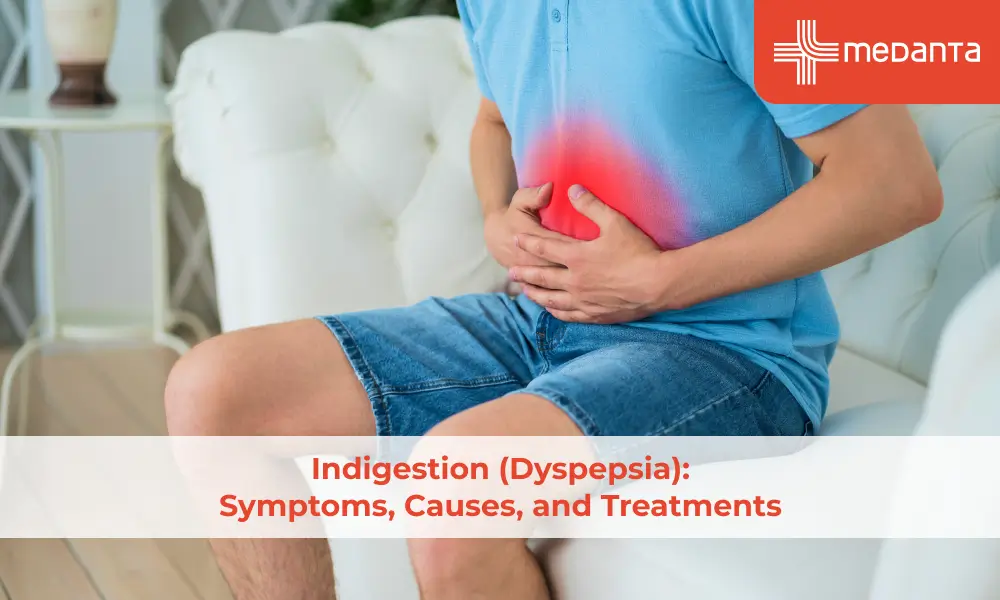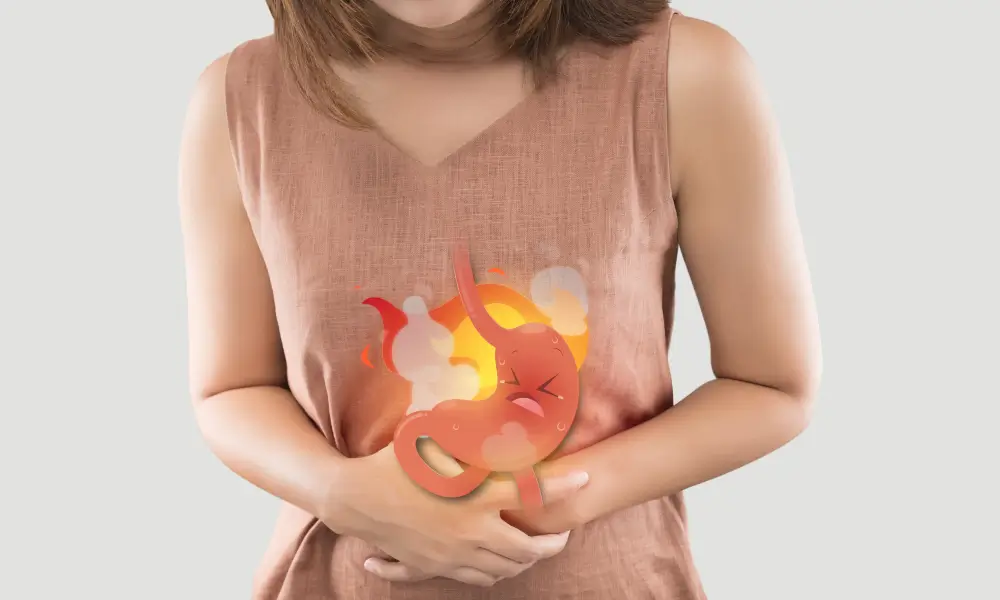Indigestion (Dyspepsia): Symptoms, Causes, and Treatments

TABLE OF CONTENTS
Many people deal with indigestion symptoms throughout their lives. This condition, which doctors call dyspepsia, brings several symptoms that usually show up together. A brief upset stomach is normal, but these uncomfortable feelings can last for weeks or maybe even months in some cases.
People with dyspepsia typically feel a burning sensation or pain in their upper belly. They might get uncomfortably full before finishing their meals or stay bloated after eating. The fullness can become so intense that eating a regular meal becomes a challenge. Several medical conditions can trigger these symptoms. The mechanisms behind many cases remain unclear. Anyone experiencing symptoms that last more than two weeks should see a doctor.
Let's explore what dyspepsia is, what the causes of this condition are, and the effective ways to manage it. A better grasp of this condition helps you manage it well.
What Are the Common Symptoms of Dyspepsia?
Dyspepsia affects up to 20% of the population and ranks among the most common digestive complaints. Symptoms don't stay constant. People often feel:
Pain or burning in the upper abdomen (epigastric area)
Bloating
Getting full quickly before finishing meals
Nausea after a meal or throwing up occasionally
Too much belching and gas
A feeling of fullness comes early during meals, which sometimes makes finishing a normal-sized meal impossible.
Some people might also experience burping, regurgitation, or acid reflux.
These symptoms can last anywhere from minutes to hours after eating.
What Causes Dyspepsia?
Doctors call most chronic indigestion cases functional dyspepsia, which they see as a gut-brain interaction disorder. Routine tests might not show any obvious issues. It can be organic or functional. Several medical conditions can trigger these symptoms - irritable bowel syndrome, ulcers, gastroesophageal reflux disease, excessive stomach acid, or slow stomach emptying.
Risk factors include:
Using medications such as pain killers, steroids, bisophosphonates, iron supplements, antibiotics
Smoking
High intake of caffeine, alcohol, spicy/fatty foods, carbonated drinks
Anxiety or depression
History of childhood abuse
Helicobacter pylori infection
How Is Dyspepsia Treated?
Symptom management takes priority over finding a cure. Doctors usually recommend:
Lifestyle Changes:
Eat several small meals throughout the day instead of having big heavy ones.
After eating, don't lie down immediately. Wait at least two to three hours before lying down to prevent discomfort.
Take your time chewing food so your stomach has an easier time digesting it.
Stop smoking because it damages the oesophageal sphincter and makes symptoms worse.
Use techniques like yoga, meditation or deep breathing to manage stress better.
Raise your head when you sleep to stop acid reflux from happening at night.
Medications:
Antacids - neutralise stomach acid and might help with mild dyspepsia symptoms
H2 blockers (famotidine, cimetidine) - reduce acid production in the stomach.
Proton pump inhibitors (PPIs) - strong acid reducers
Prokinetics - speed up stomach emptying
Antibiotics for H. pylori infection
Low-dose antidepressants - calm your nervous system and might help with functional dyspepsia.
Psychological Support or Therapy: To address stress-linked or functional dyspepsia, you could explore:
Cognitive Behavioural Therapy (CBT)
Biofeedback
Hypnotherapy

How Can Dyspepsia Be Prevented?
You need to spot and avoid your personal triggers.
Many people benefit from limiting fatty, spicy foods, acidic items like tomatoes and oranges, and cutting back on caffeine, alcohol and carbonated drinks.
Eating five or six small meals instead of three large ones helps. Proper chewing gives you time to enjoy meals.
Keep a healthy weight to lower the strain on your stomach.
Wear clothing that fits to avoid putting extra pressure on your abdomen.
Get regular exercise but skip heavy workouts right after eating.
When Should You Seek Medical Attention for Dyspepsia?
Seek your doctor's guidance if you notice:
Bloody in your vomit
Dark tarry stools
Trouble breathing
Pain moving to your jaw, neck, or arm
Losing weight without a clear reason
If indigestion lasts beyond two weeks or gets worse despite home remedies.
Conclusion
Living with dyspepsia definitely has its challenges. The good news is that most people can manage this condition well by making simple lifestyle changes. Small tweaks to your diet can make the most important difference. You will digest food better if you eat smaller meals more often instead of three big ones. It also helps to know which foods trigger your symptoms.
Managing stress is a vital part of dealing with dyspepsia. Your symptoms can improve with regular exercise, sleeping in the right position, and waiting long enough after meals before lying down. These simple steps might reduce your need for medicine.
Note that dyspepsia affects everyone differently. Something that helps one person might not work for someone else. That's why you should keep track of your symptoms to find what triggers them in your case.
Most people feel much better when they combine lifestyle changes with proper medical care. While dyspepsia can be uncomfortable, it rarely causes serious health problems when managed properly. The key is to understand what triggers your symptoms and work with your healthcare team to create a plan that works for you.
FAQs
What are the typical signs and symptoms of dyspepsia?
Your stomach discomfort might be different from others, but certain patterns show up regularly. Most people experience:
Burning or pain in their stomach
Excessive
belching
Bloating
Nausea after meals
Which medical conditions or lifestyle factors can lead to dyspepsia?
Your indigestion could come from several sources:
H. pylori bacterial infections
Gastroesophageal reflux disease (GERD)
Peptic ulcers
Gastroparesis (when your stomach empties slowly)
Gallstones or gallbladder inflammation
Your lifestyle choices matter just as much. Eating too fast, spicy or fatty foods, smoking, too much caffeine or alcohol, & ongoing stress can make things worse.
Some medications like NSAIDs, antibiotics, and iron supplements might trigger symptoms too.
How do doctors diagnose dyspepsia?
Doctors begin by taking a full history and doing a physical exam. They ask about your symptoms, medicine use, and past health issues.
Your doctor might recommend:
Blood tests
Stool samples
Breath tests to check for H. pylori infection
Upper gastrointestinal endoscopy
What medications are commonly used to treat dyspepsia?
Your treatment options include:
Antacids - quickly neutralise stomach acid
H2 blockers - reduce acid production
Proton pump inhibitors - stronger acid control
Prokinetics to speed up stomach emptying
Antibiotics for H. pylori infections
Are there any home remedies or dietary changes that help with dyspepsia?
Natural remedies can make a difference:
Clinical studies back up peppermint and caraway oils
Chamomile tea soothes an upset stomach and gas
Ginger helps your stomach contract better
Aloe vera juice might ease heartburn, belching, and nausea






